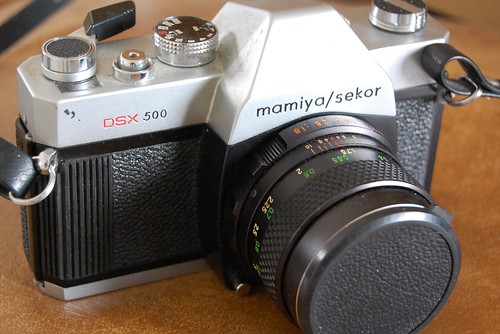Difference between revisions of "Mamiya DSX 500"
m (Typo) |
(Note US-market engraving and wiki link open-aperture) |
||
| (3 intermediate revisions by one other user not shown) | |||
| Line 6: | Line 6: | ||
|image_by= Mark H. Anbinder | |image_by= Mark H. Anbinder | ||
|image_rights= non-commercial | |image_rights= non-commercial | ||
| − | }}The '''[[Mamiya]] DSX''' came in two models, the '''DSX 500''' and the '''[[Mamiya DSX 1000|DSX 1000]]'''. Both offered a choice of [[TTL]] averaging or spot metering, selected with an A/S switch alongside the lens mount. The numerical model designation referred to the fastest shutter speed offered by each; and the DSX 500 also lacks the self-timer found on the DSX 1000 | + | }}The '''[[Mamiya]] DSX''' came in two models, the '''DSX 500''' and the '''[[Mamiya DSX 1000|DSX 1000]]'''. Both offered a choice of [[TTL]] averaging or spot metering, selected with an A/S switch alongside the lens mount. The numerical model designation referred to the fastest shutter speed offered by each; and the DSX 500 also lacks the self-timer found on the DSX 1000. "Mamiya/Sekor" is the brand engraving on US-market cameras. |
| − | The related [[Mamiya MSX 500|MSX 500]] and [[Mamiya MSX 1000|MSX 1000]] were similar cameras, but only offering the spot-metering option. All these models used the SX series of [[42mm screw lenses#Mamiya|Mamiya 42mm screw lenses]]. SX-series Mamiya lenses have a lens mount lock (unlike previous Mamiya threaded lenses) and a mechanical pin which transmits the f-stop information to the camera, | + | The related [[Mamiya MSX 500|MSX 500]] and [[Mamiya MSX 1000|MSX 1000]] were similar cameras, but only offering the spot-metering option. All these models used the SX series of [[42mm screw lenses#Mamiya|Mamiya 42mm screw lenses]]. SX-series Mamiya lenses have a lens mount lock (unlike previous Mamiya threaded lenses) and a mechanical pin which transmits the f-stop information to the camera, enabling [[open-aperture metering]]. |
== Links == | == Links == | ||
* [http://www.butkus.org/chinon/mamiya/mamiya_dsx_1000_dsx_500/mamiya_dsx_1000_500.htm DSX 500 and DSX 1000 manual] from Mike Butkus' [http://www.butkus.org/chinon OrphanCameras.com] | * [http://www.butkus.org/chinon/mamiya/mamiya_dsx_1000_dsx_500/mamiya_dsx_1000_500.htm DSX 500 and DSX 1000 manual] from Mike Butkus' [http://www.butkus.org/chinon OrphanCameras.com] | ||
| − | * [http://www.herron.50megs.com/sx.htm Mamiya MSX and DSX], at [http:// | + | * [https://web.archive.org/web/20190817130537/http://www.herron.50megs.com/sx.htm Mamiya MSX and DSX], at [https://web.archive.org/web/20170711091708/http://herron.50megs.com/index.html Ron Herron's "Collecting Mamiya 35mm Cameras"] (archived) |
[[Category: Japanese 35mm SLR]] | [[Category: Japanese 35mm SLR]] | ||
[[Category: 42mm screw mount]] | [[Category: 42mm screw mount]] | ||
| − | [[Category: Mamiya]] | + | [[Category: Mamiya|DSX 500]] |
[[Category: M]] | [[Category: M]] | ||
| − | [[Category: D|Dsx 500]] | + | [[Category: D|Dsx 500 Mamiya]] |
Latest revision as of 15:31, 8 March 2023

|
| Mamiya/Sekor DSX 500 image by Mark H. Anbinder (Image rights) |
The Mamiya DSX came in two models, the DSX 500 and the DSX 1000. Both offered a choice of TTL averaging or spot metering, selected with an A/S switch alongside the lens mount. The numerical model designation referred to the fastest shutter speed offered by each; and the DSX 500 also lacks the self-timer found on the DSX 1000. "Mamiya/Sekor" is the brand engraving on US-market cameras.
The related MSX 500 and MSX 1000 were similar cameras, but only offering the spot-metering option. All these models used the SX series of Mamiya 42mm screw lenses. SX-series Mamiya lenses have a lens mount lock (unlike previous Mamiya threaded lenses) and a mechanical pin which transmits the f-stop information to the camera, enabling open-aperture metering.
Links
- DSX 500 and DSX 1000 manual from Mike Butkus' OrphanCameras.com
- Mamiya MSX and DSX, at Ron Herron's "Collecting Mamiya 35mm Cameras" (archived)